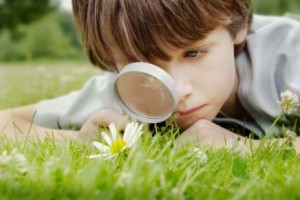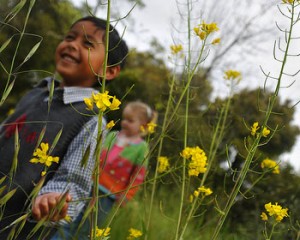Eliminating Nature Deficit Disorder in Children
By Alex Lui an Lieh, Lecturer & Clinical Psychologist, Department of Psychology
Faculty of Behavioural Sciences, HELP University
Once upon a time when apples and blackberries were just fruits; children were allowed to play on their own without much adult supervision. As long as they came back before dusk, they were allowed to climb trees to pluck mangoes, dig for worms to feed chickens, and for the more daring, jump into the river just for fun. The only dangers were the occasional made-believe ghosts and demons parents used to scare children into coming back before the sun comes down. Strangers do not kidnap children for ransom or touch them in inappropriate ways. In fact, strangers watched over these children and helped them get back to their parents if they wandered too far off and got themselves lost.
Then something happened, the ghosts and demons that came out when nighttime falls began to take the shape of human beings. After a while, they even began to adapt to light and no longer confined themselves to the dark. The world now becomes too dangerous for children and parents could no longer allow them to venture out on their own. At the same time, parents have to deal with other kinds of evil spreading across the world – Inflation, Corruption, Bankruptcy and many other products of Greed and Pride.
 Because parents are now too busy fighting their own battles, they do not have time to accompany their children outdoors where they could play like before. Consequently, the safest place for these children is in their respective homes. Soon apples became computers and black berries became phones, and children were able use these devices to climb trees, dig for worms, and jump into rivers in a virtual way while remaining safe. Moreover, the trees outsides have morphed into buildings, the earth into concrete, and the rivers into roads. Hence, children forget that they have another parent called Mother Nature, who used to teach them about life and how to care for living things.
Because parents are now too busy fighting their own battles, they do not have time to accompany their children outdoors where they could play like before. Consequently, the safest place for these children is in their respective homes. Soon apples became computers and black berries became phones, and children were able use these devices to climb trees, dig for worms, and jump into rivers in a virtual way while remaining safe. Moreover, the trees outsides have morphed into buildings, the earth into concrete, and the rivers into roads. Hence, children forget that they have another parent called Mother Nature, who used to teach them about life and how to care for living things.
In 2005, Richard Louv wrote a book called ‘Last Child in the Woods’ in which he introduced the term Nature Deficit Disorder. He was referring to the negative impact of the lack of exposure to nature in children in the cities, and how this has also slowly began to affect children in the rural areas. Among the ‘symptoms’ he associates with the ‘disorder’ include the development of attention disorders, obesity, depression and the dampening of their natural creativity. He observed that children with Nature Deficit Disorder are more likely to get sick, develop myopia, become stressed, aggressive and are less adaptable to change.
While we could hardly deny the fact that children of this wired generation do not play outside as often as before, it may seem like an overkill to give it a diagnostic term befitting a mental condition. The term Nature Deficit Disorder is not officially recognised by the American Psychiatric Association as an official diagnosis in its Diagnostic Manual for Mental Disorders. Louv himself never intended it to be a formal medical diagnosis, but used the term to describe the psychological, physical and cognitive effects of alienating children from nature. Every psychologists agree that the development of children is highly dependent on the use of their senses in discovering the world around them. Thus, when children are limited in how much they are able hear, see, taste, smell and touch; their brains do not make as many connections between the synapses as compared to children who have a more enriched environment.
Results from a recent study conducted by a team of Canadian researchers from the University of Ottawa, University of Montreal, McGill University, and Laval University, found that time spent by children in moderate and vigorous activities is a better predictor of cardiometabolic health than time spent in sedentary activities. This seems to suggest that not only is it important for children to spend less time watching television and playing video games, they must also be involved in moderate to intense physical activities in order to decrease their cardiometabolic risk factors which include having lower waist circumference, lower blood pressure and higher levels of HDL (good) cholesterol.
Unfortunately, our children’s daily schedules today do not allow for much physical activity. The moment they wake up in the morning, they end up sitting at the breakfast table, sitting in the school bus, sitting in the classroom, sitting in the canteen, sitting in the tuition centre, sitting to practice the piano, sitting in front of the television before finally going back to sleep. Unless they are actively involved in some sporting activity, they probably do not move very much throughout the day. This kind of childhood lifestyle is the concern Louv aimed to address when he coined the term Nature Deficit Disorder and he has very good reasons to be concerned because health psychologists know very well that health habits, both good and bad, are formed in childhood and can be highly resistant to change later in life. An individual who exercises during childhood is more likely to do so as an adult.
Besides the lack of physical activity, children who do not have much contact with nature are often faced with the dilemma of having activities they engage in prescribed to them instead of allowing room for innovation and creativity. Louv believes that this disconnect with nature is associated with the diminished independent play in which children are able to make up their own games, situations and dialogues without much adult intervention and direction. Watching television, even educational programmes, does not require much imagination and creation. Computer games and even board games already come with a set of rules and regulations that children have to adhere to in order to play. Gone are the days when children invent their own games and create their own sets of rules together with an entire make-believe scenario to go along with it.
Louv also believes that when children are allowed to regulate their own games, they are also exercising self-control. Parents nowadays tend to overregulate and overprotect their children to the point that children are no longer able to think and decide for themselves. Even the activities that children get themselves involved in such as music lessons and sports are adult-controlled. As a result, children become more and more controlled by external forces rather than being empowered to create their own internal value systems. Hence the mentality; if my teacher is not strict, I need not pay attention in class and if my parents are not at home, I can watch as many movies as I like on TV. Thus, Louv argues that children who are exposed to nature exercise great self-control than those who are nature deprived.
While digital devices and the use of Internet open our children up to an unprecedented amount of information, they also limit the use of all of their senses. Electronic devices often require the intense use of the visual and auditory senses to the total exclusion of other senses. Such directed use of senses can block out the other senses while causing a burn out in the overused senses. This then leads to conditions such as myopia and noise-induced hearing loss. Noise exposure among children and adolescents are becoming increasingly common in this age of iPods and personal music players. In fact, the US National Institute on Deafness and Other Communication Disorders reported a hearing loss in 17 out of 1000 children under the age of 18.
Is there a cause of concern when our eight-year-old can identify 25 percent more Pokemon characters than wildlife species? This is, in fact, what was found by a research conducted by zoologists in the University of Cambridge among a sample of primary school children in the UK. People generally care about what they know and our children do not know much, let alone care about their natural environment. The researchers also identified a link between a loss of knowledge about the natural world to growing isolation from it amongst school children.
It is said that people who care deeply about the future of the environment could almost always recall some divine experiences in nature when they were children. Conservation psychologists believe that in order for our planet to survive, we need to teach our children how to conserve it. However, before we can even teach our children about conservation, they must first want to conserve it. In order to want to conserve it, they need to know what they are conserving by having a firsthand experience with it. We want our children to learn empathy towards living things, to treat nature as part of the ecosystem in which they belong.
The concern now is that not only are children being alienated from nature, they are also being alienated from their own parents as children begin to spend more time with their gadgets. How many parents actually take the time to watch the same television programmes with their children and talk about what they are watching? How many parents will play the same video games with their children? Not only are our children suffering from Nature Deficit Disorder, many are also suffering from Parent Deficit Disorder – a term while unbelievable has already been coined – while not an official medical diagnosis, points to the lack of interaction that children today have with their parents.
Dr. Louise Chawla, a Professor in the Environmental Design Program at the University of Colorado in Boulder found that individuals who choose to be involved in environmental issues as adults have had positive direct experiences in the outdoors, with someone close, such as a parent, grandparent, or other trusted guardians. Taking out your children for a nature walk, minus the Dr Dre Beats headphone, forces them to interact both with you and the environment. Parents need to provide the narration because this is not National Geographic with built-in narrative describing what you just saw jumping from tree to tree. Describe to your children what you see and how it makes you feel. For example “Wow, look that the sky, it’s so blue!” The experience of being together as a family surrounded by nature is something no Internet platform or device can give to your children. It is a gift that is uniquely yours.
The question now is whether or not we are willing to sacrifice our children’s safety for the sake of their personal development. This is a question that every parent has to grapple with. If safety is the main issue of not allowing our children to venture outdoors, parents should provide the security and accompany them out. It is imperative, nevertheless, that parents do not make decisions based on their own convenience; i.e going to the nearest park is too much of a hassle, it is easier to just sit in front of the television and learn about animals and plants from the Discovery Channel. It is undeniably much safer and the children learn much more too – not necessary in terms of the experience per se, but they will definitely acquire more knowledge on the subject of nature. However, if this is allowed to happen, eventually, we will end up with a generation who knows a lot about everything but does not feel connected to anything.
If only we have a safer places in our neighbourhood for our children to walk, ride their bicycles and play. Unlike the United States, with vast amount of reserve lands to preserve nature, countries like Malaysia and Singapore do not have much land to begin with. We know we cannot halt development because the momentum created by capitalism is just too powerful to overcome. Nevertheless, occasionally we may stall it by protesting the next development project behind our condominium even if we know that it is only a matter of time before we get another condominium beside our own or another shopping mall along with the traffic that comes with it.
The only thing left for us to do it to help our children find a balance between nature and technology. The more high-tech their lives become, the more nature they will need. As parents, the onus is on us to help them get it. Perhaps they will get to snap pictures of birds or record the sounds of crickets with their latest iPhone and share these on their Facebook page the next time your family decides to make a trip to Taman Negara for the school holidays instead of to the latest shopping mall in the neighbourhood.










